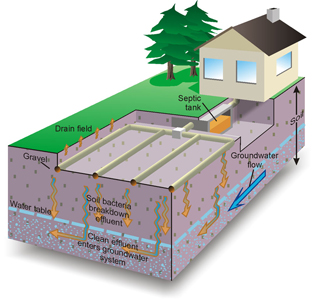Maintenance and regular inspections (we recommend every 5-7 years) are crucial to owning an effective and efficient septic system. Additionally, they give an accurate assessment of your system’s overall health and help target any repairs or upgrades your system might need. Magneson Tractor Service offers thorough septic inspections covering all components and parts of your system.
Who Should Complete Septic Evaluations?
Only a licensed septic specialist should complete inspections, repairs, or replacements to your septic system. You can check to see if your contractor is certified with the Town of Paradise here, and check their Specialty C-42 or C-36 licence on the CSLB website.
Types of Septic System Inspections - Not every septic system inspection is the same. Broken down into two general categories, they are either visual inspections or full inspections
Visual Inspections
These are exactly what they sound like – a visual inspection of your septic system. Typically, these are done by a home inspector. Normally, they are not performed by a professional septic company, unless requested by the lender or savvy home buyers.
Visual inspections are quite simple. They include tasks like:
Running the water in the home
Flushing the toilets
A general walk-through and glance at the area of the yard containing the septic system.
If there are no backups, slow draining sinks, or water puddles in the absorption area – the system passes. Pretty basic. This is usually the service a home inspector will do when you are buying or selling a home. If you are looking into buying a home, it may be worth the money for a full inspection. Visual inspections only tell you about the service, not the health of the tank or leach field.
Full Inspections
Full inspections are the standard for professional septic companies. You want a pro like Magneson Tractor Service to give your system a once-over before handing out a passing grade. We want to know all of the nitty-gritty details.
Full inspections dive deep. The septic tank is opened and examined. Where is the water level? Too full means its overloading, but too low means a possible leak. Where is the sludge line? Is it time to pump the tank?
Sometimes, the tank will be pumped down, checking for back flow from the leach field – an indication of a blockage or backup. There are a few situations during an inspection when it is best to avoid septic tank pumping. No aspect is overlooked with a full inspection.
Why Schedule a Septic System Inspection?
Regular Maintenance - It’s that time, the time to inspect your system. Whether you have a regimented schedule or you’ve forgotten until now; either way, it’s time to give your septic system a check-up.
You Notice a Problem - Just had a pump-out less than a year ago, but your sink and toilets are draining slowly? It’s time to schedule a septic tank inspection for backups or blockages. Stop damaging the natural and crucial bacteria in your tank with harsh “fix-it” chemicals. Let a septic professional find the problem and address it directly – the bacteria in your system will thank you.
Upcoming Construction - Expanding or remodeling your home is an exciting project – but, make sure your septic is ready for it. Can it handle the additional bathroom? Can you add to that existing pipe, or is it on overload? Also, where is the leach field and septic tank – so you don’t park or build on it? These are all questions answerable after an inspection.
Buying a New Home with a Septic System - Buying a new home is daunting – and expensive. Save yourself from costly repairs a few years later by ordering a full inspection by a professional septic company. While home inspectors perform visual inspections, they don’t cover everything and problems are easily missed. Give yourself that peace of mind.
Our Septic Inspections
We pride ourselves on thorough septic system inspections for residential and commercial systems. Magneson Tractor Service considers your entire system from pipes to tank, utilizing possible repair strategies to keep your system healthy and functioning.
We evaluate the following items during septic system inspections:
Location, age, size, and original design
Soil conditions, drainage, water table heights, and flooding potential of the surrounding area
History of inspections and repairs when available
The last time your septic tank was pumped
Sludge levels in your tank. If not recently pumped, these could potentially be high
Check for back flow from the leach field into the tank. This indicates potential backups or blockages in the absorption field.
Absorption field condition. Notably, we look for evidence of liquid waste reaching the soil surface, which leads to water contamination. In addition, we inspect for signs of compaction and damage from too much weight on the field.

